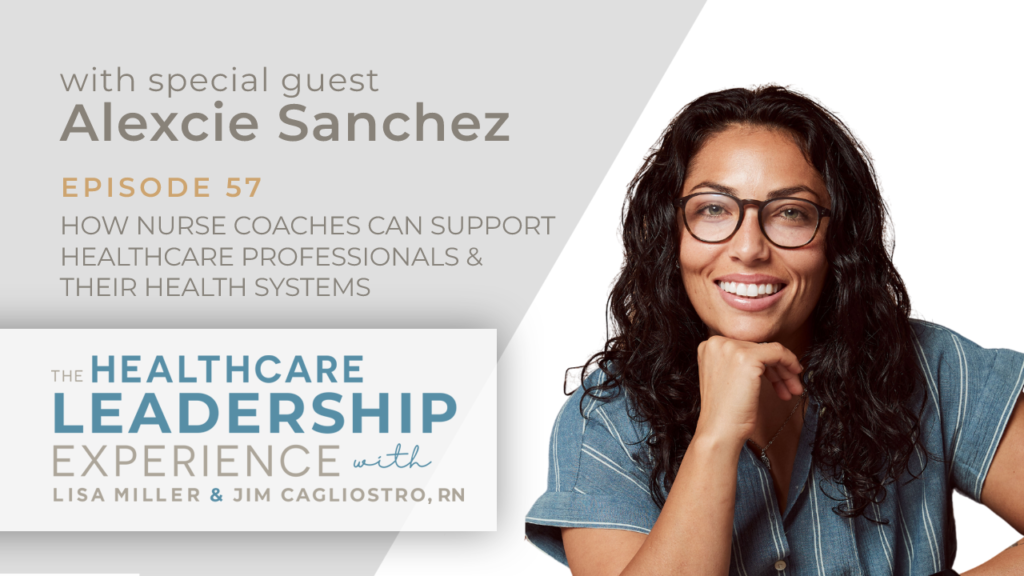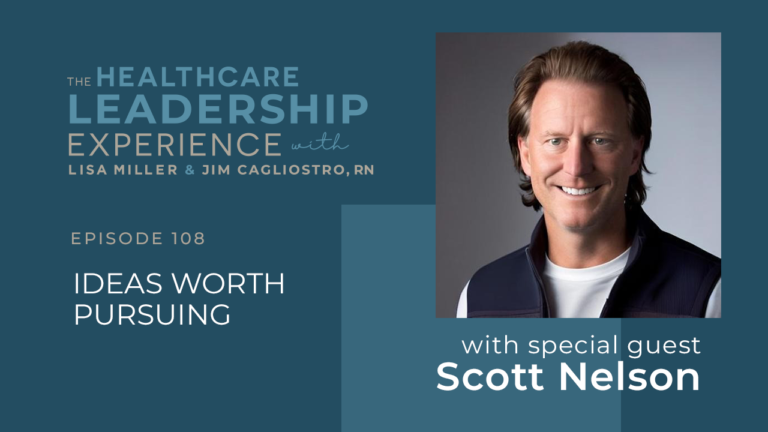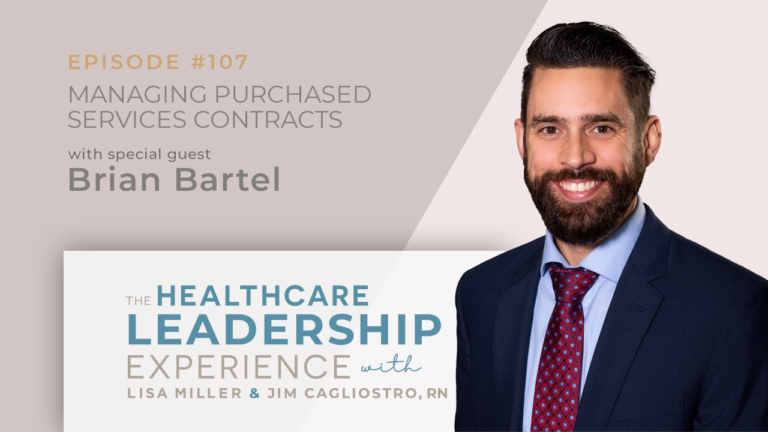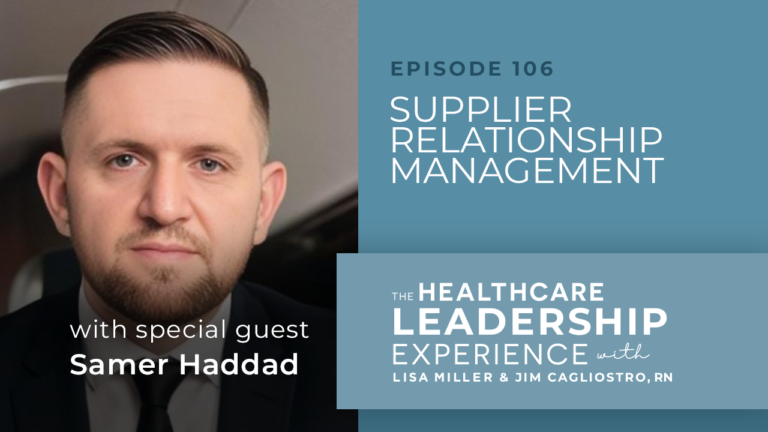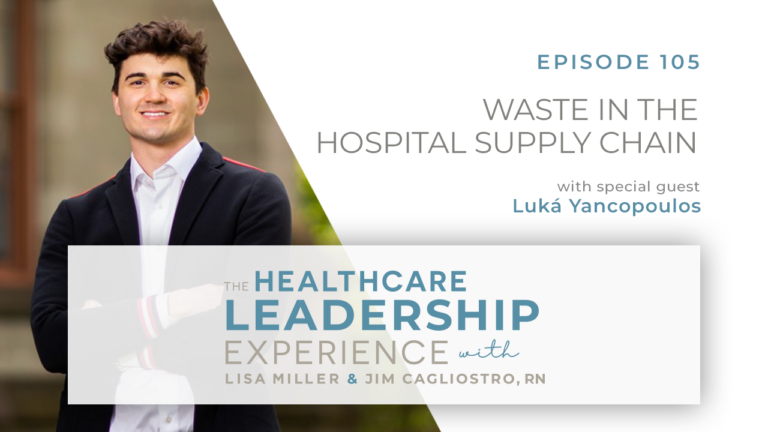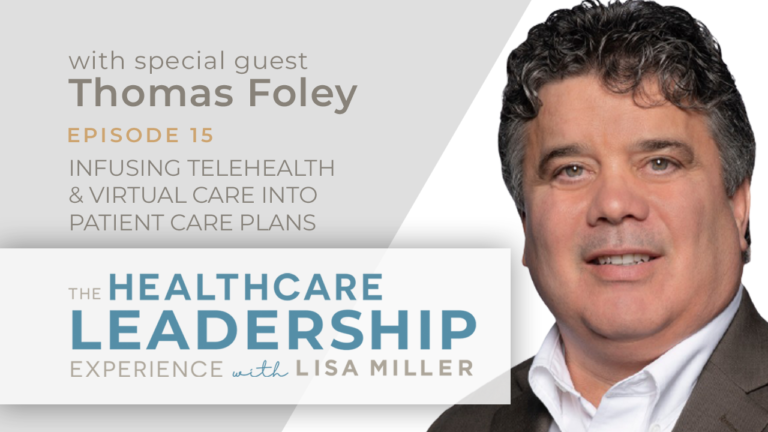In Episode 57 of The Healthcare Leadership Experience, Jim Cagliostro is joined by Board-Certified Nurse Coach Alexcie Sanchez BSN, RN, CEN, NC-BC to discuss the impact of her role on nursing and the community.
Episode Introduction
In this episode, Jim Cagliostro, VIE Healthcare’s Clinical Operations Performance Improvement Expert, interviewed Alexcie Sanchez to learn more about nurse coaches. Topics include, taking a more holistic approach to health and wellbeing, the growing need for nurse coaches, the positive impact of nurse coaching on burnout, and why nurse coaches are a ‘’shining light’’ in healthcare.
Show Topics
- What is a nurse coach?
- Exploring available options for nurse coaches
- Partnering with a nurse coach is a powerful experience
- Covid-19 – a tipping point in self-care
- Coping with burnout during a crisis
- Utilizing nurse coaches in a hospital benefits everyone
Main Topics
02:14 What is a nurse coach?
Alexcie explained that a nurse coach works with any individual who wants to improve their health and wellbeing.
‘’….simply put, a nurse coach is a registered nurse who has specialized training in the art of coaching. We’re trained to use a holistic approach, so I love to use the phrase a whole person approach. We really look at the individual’s life when it comes to caring for an individual. So their lifestyle, their daily activities, their food intake, sleep habits, everything when it comes to caring for an individual, and I always want to make it clear right off the bat too, because we’re called nurse coaches, we don’t actually just work with nurses. It just means that we’re nurses that are specialized in coaching. So nurse coaches work with anybody and everybody that has any desire to make a change.’’
03:28 Exploring available options for nurse coaches
Alexcie shared the options open to nurse coaches, from hospitals to private companies, emphasizing that working with a nurse coach not a one-time encounter.
‘’I have my own private practices as a nurse coach. So I work virtually with individuals. If they’re local, I’ll work with them. If they want to meet in person, I can do that. But basically, nurse coaches can have their own private practice. They’re hired by insurance companies to help patients manage chronic or new acute illnesses, especially if it’s like a terminal illness. They can provide that emotional support to them and their families. Nurse coaches can be hired by organizations and companies to promote just overall health and wellbeing, which helps not just the employees but the organization in general. And then nurse coaches can also work for hospitals where they not only help the patients while using that holistic approach, but also helping the staff and the employees of the hospital as well. So nurse coaches can really work in any sort of environment. They can work at clinics in doctor’s offices, they can work for themselves. It’s just really a matter of who they desire to work with and what sort of environment they’d like to work in…..It normally wouldn’t be a one time encounter, it will be an encounter that lasts over weeks to months depending on the person’s desires.’’
12:15 Partnering with a nurse coach is a powerful experience
Alexcie said our minds can dictate our behavior. Nurse coaches encourage accountability and offer reassurance.
‘’…anyone that is desiring to make any change in their life can reach out to a nurse coach. Whether it is health or disease related or not. We’re really also trained in that mindset modification. Our minds, our thoughts really dictate a lot of our behaviors. So I know we often feel like we can do things on our own, but with a partner, whether it’s for accountability reasons, reassurance advice, sharing your journey with a nurse coach can be a really powerful experience. And many nurse coaches specialize in certain niches. So for example, maybe you’re a med-surge nurse or a PCU nurse and you’re really well versed in type 2 diabetes and you love that education. There’s nurse coaches out there that specialize in just working with individuals with type 2 diabetes to help them manage or reverse their disease. There’s nurse coaches out there that have OB and maternity experience, so they just work with pregnant women or postpartum nurse coaching. So there’s literally so many different niches within the nurse coach community that you can seek a nurse coach that is specializing in whatever you’re looking for.’’
15:31 Covid-19 – a tipping point in self-care
Alexcie commented that Covid raised awareness of the importance of taking care of ourselves.
Nate said leaders must create culture and inspire excellence in everything they do.
‘’I think it’s really about health awareness at this point, not just the nurse world. And I’ll start with this example. So Covid comes in and I think a lot of people, or at least I especially witnessed that our pre-existing conditions, our comorbidities are playing a substantial role in how covid is managed, treated and recovered from. So my hope is that we can continue to become more aware of how we take care of ourselves and how every aspect of our life plays a factor. What we eat, how we sleep, how we move, how we think, how stress plays a role in our overall wellbeing. So all of these things are exactly what a nurse coach can help with. So I’m hoping that as health awareness increases the ability, the desire for someone to want to make change in asking for help, and that’s where a nurse coach can really come into play.’’
17:15 Coping with burnout during a crisis
Alexcie said that she worked with her own nurse coach to help her work through fatigue and burnout.
‘’…I came to realize that these things were not going to happen overnight. Our system is potentially broken, but nothing’s going to change tomorrow. So that’s when I started really looking within myself and figuring out, “Okay, how can I cope with this today? Because I don’t want to leave the emergency department.” I loved where I was, I wasn’t ready to leave. So how do I manage it better? How do I deal with the fact that I can’t change what’s going on around me, but I can change how I deal with it? And that’s when I really started looking within and seeked my own coach that I’ve worked with in the past to really work with me in those moments to figure out, okay, how do I get through this frustration, this fatigue? And it really came down to just self-care in those moments. How do I take care of myself? How do I take care of me right now while this stress and overworking and fear of the unknown is going on?’’
20:03 Utilizing nurse coaches in a hospital benefits everyone
Alexcie said leadership, nurses and patients all thrive when hospitals use nurse coaches.
‘’So utilizing nurse coaches in a hospital setting literally is a win for everybody, right? When preceptors and management are trained in holistic nurse coaching, they’ll first learn how to develop a truer sense of themselves. Because if they go through this training, it’s really about finding within their strengths and how they can capitalize on becoming better mentors and leaders, which is a win for the nurses and the overall staff when we have management that is taking care of themselves holistically. When the staff has strong understanding, compassionate leadership, they will ultimately thrive. And when the nurses thrive, the patients will thrive, retention will improve, nurse shortages will diminish and appropriate nurse to patient ratios will follow. It’s literally a win for every single person in the hospital.’’
Show Links
📱Connect with Lisa Miller on LinkedIn
📱Connect with Jim Cagliostro on LinkedIn
📱Connect with Alexcie Sanchez on LinkedIn
🖥 Check out VIE Healthcare and SpendMend
You’ll Also Hear:
- A journey to nurse coaching working in ER during the pandemic: how Alexcie’s nursing career evolved into a more holistic approach to care. ‘’My mom really raised my brother and I in a more Eastern philosophy manner. So I’ve always taken that approach when it came to healing and then being an ER nurse, it’s two different worlds in a sense.’’
- The importance of the mind-body connection and how to become a nurse coach.
- ‘’You must be a registered nurse with at least two years of working experience and you have to complete at least 60 continuing nursing education hours in holistic nursing. And then you also need 60 mentored or supervised coaching hours. I personally used what’s called the Nurse Coach Collective’’.
- Raising the profile: why education and raising awareness of nurse coaching is vital to the healthcare sector and patient care.
- How Alexcie helps nurses rediscover their power and true potential. ‘’Right now, my mission is really to help nurses…..I love to go really deep with these individuals to figure out how to create happiness.’’
- Shining a light on a broken system: How the pandemic highlighted the flaws in the healthcare system. ‘’… unfortunately along with the patients, the nurses were at the center of it all. We were in the middle of chaos in a sense. Unknown fear, I think a lot of fear also comes to play. I can share personally, it was scary.’’
- Why nurse coaches are a ‘’shining light’’ in the lives of individuals.
What To Do Next:
- Subscribe to The Cost Advantage for Healthcare Leaders and receive a special report on 15 Effective Cost Savings Strategies.
- Learn more about the simple 3 step process to work with us.
- If you are interested in learning more, the quickest way to get your questions answered is to speak with one of our margin improvement experts. Schedule a call with our team.
Episode Transcripts
CLICK HERE TO DOWNLOAD THE PDF TRANSCRIPT
CLICK HERE TO OPEN THE TRANSCRIPT
Introduction (00:55):
Welcome to The Healthcare Leadership Experience Podcast hosted by Lisa Miller and Jim Cagliostro. Lisa is the founder of VIE Healthcare Consulting and now managing director at SpendMend. Lisa and her team has generated over $1 billion in financial improvements for VIE’s clients since 1999.
Since 2007, Jim has been a registered nurse working in critical care, perioperative services, and outpatient settings at nationally recognized medical facilities across three states.
You’ll hear conversations on relevant and trending topics in healthcare and much more. Now here’s your hosts, Lisa and Jim.
Jim (01:34):
Hi, this is Jim Cagliostro, and you are listening to The Healthcare Leadership Experience Radio Show. Today’s guest is Alexcie Sanchez, board-certified nurse coach. We’re excited today to learn more about nurse coaching and really the impact that a nurse coach can have for nurses, but not just for nurses for the broader healthcare community. So welcome and thanks for joining us today, Alexcie.
Alexcie (01:56):
Yeah, thank you so much for having me, Jim. I’m more than happy to spread the word and share the power of nurse coaching with all the listeners out there.
Jim (02:04):
Awesome, thank you. So, we’ll jump right into it and ask right off the bat, what is a nurse coach and who can benefit, obviously nurses, but who specifically can benefit from nurse coaching?
Alexcie (02:14):
Yeah, absolutely. And simply put, a nurse coach is a registered nurse who has specialized training in the art of coaching. We’re trained to use a holistic approach, so I love to use the phrase a whole person approach. We really look at the individual’s life when it comes to caring for an individual. So, their lifestyle, their daily activities, their food intake, sleep habits, everything when it comes to caring for an individual, and I always want to make it clear right off the bat too, because we’re called nurse coaches, we don’t actually just work with nurses. It just means that we’re nurses that are specialized in coaching. So, nurse coaches work with anybody and everybody that has any desire to make a change.
Jim (02:57):
Great. So that’s news to me. I guess my impression has always been, oh, a nurse coach, great… But you’re absolutely right in terms of the training that nurses have. And when you talk about that holistic approach, it’s basically how when we’re at the bedside and we’re caring for a patient, the whole person, you’re not just thinking about their physical ailment, but there’s family, there’s relationship issues, there’s insurance issues, and that’s great. So looking at the whole person. So can you share a little bit more about how nurse coaching works? Maybe some more details about what it looks like day to day?
Alexcie (03:28):
Yeah, absolutely. So I’ll start with personally, I have my own private practices as a nurse coach. So I work virtually with individuals. If they’re local, I’ll work with them. If they want to meet in person, I can do that. But basically, nurse coaches can have their own private practice. They’re hired by insurance companies to help patients manage chronic or new acute illnesses, especially if it’s like a terminal illness. They can provide that emotional support to them and their families. Nurse coaches can be hired by organizations and companies to promote just overall health and wellbeing — which helps not just the employees but the organization in general. And then nurse coaches can also work for hospitals where they not only help the patients while using that holistic approach, but also helping the staff and the employees of the hospital as well. So nurse coaches can really work in any sort of environment. They can work at clinics in doctor’s offices, they can work for themselves. It’s just really a matter of who they desire to work with and what sort of environment they’d like to work in.
Jim (04:34):
Wow, that’s great. So I’m kind of curious, just personally, so I’m on the… Or if you start a new medication, a lot of times it’ll be a nurse that follows up with you. I imagine the nurse coach is a little bit more involved, goes a little bit deeper than just that initial, “Hey, how are you doing with the medication? Any side effects.”, things like that.
Alexcie (04:52):
Yeah, absolutely. Usually it’s a bit of a relationship that’s more involved. It normally wouldn’t be a one-time encounter; it will be an encounter that lasts over weeks to months depending on the person’s desires. In the hospital setting, I could see where it is more acute in the hospital, giving education, but then we’re going to follow up later on too. So being that person that is a resource to them while they leave the hospital as well. Yeah, there’s a lot of different avenues that can be taken in terms of how a nurse coach is utilized.
Jim (05:27):
That’s great. No, that’s great. Again, that’s new to me and I love to hear that. I think there’s such a need for that, especially today.
Alexcie (05:34):
Yeah.
Jim (05:35):
Let’s say someone wants to become a nurse coach. How would they go about it? Maybe it might be easier for you if you want to share your own personal journey. What got you interested in it? Did you know someone who did it or is it something that you said, “Hey, this is something that I really feel like I could have an impact on people’s lives?”
Alexcie (05:50):
Yeah, absolutely. So, I’ll kind of start with my journey and what kind of led me into even finding nurse coaching. Because as you know, if you’re a nurse, we have nurses and they don’t even know what nurse coaching is.
So, working in the emergency department during the height of the pandemic, I really became more and more aware of the desire I had to treat and care for people in a more holistic way. I love the emergency department, I love the critical aspects that come with hospital nursing, but in the ED, we don’t have that time to sit with someone and really get that assessment to affect every part of their life. So, I’ve always been raised too in a more holistic way. My mom really raised my brother and I in a more Eastern philosophy manner. So I’ve always taken that approach when it came to healing and then being an ER nurse, it’s two different worlds in a sense.
Alexcie (06:42):
So I really wanted to find a way to combine that, combine my nursing knowledge, combine all the schooling and training I have with understanding a physiological process — and taking that and also changing someone’s life in a different, more holistic manner. And I found nurse coaching, literally just doing a Google search in holistic ways to be a nurse. And nurse coaching came up and I looked into it a bit and found that this was really something I would love because I can help someone, not just with a disease or an illness, but I can help someone prevent the course to a disease or an illness. And that’s really what it’s all about. The big portion of it is about how can we take care of ourselves to prevent any long-term illness. And that’s not just what we’re doing eating or what we’re doing in terms of sleeping, but how we’re thinking too.
Alexcie (07:34):
And that mind-body connection is really something I love to incorporate in my coaching as well. So going back to the original question, how to become a nurse coach. Only a few requirements are necessary. You must be a registered nurse with at least two years of working experience, and you have to complete at least 60 continuing nursing education hours in holistic nursing. And then you also need 60 mentored or supervised coaching hours. So you have to have worked with individuals pro bono in a coaching environment and there’s programs out there to become certified. So I personally used what’s called the Nurse Coach Collective, and it is a program developed, operated, owned by nurses that have literally come up with this curriculum, an incredible training platform to become a nurse coach. And you get everything you need to learn. You really are prepared to sit for the boards if you choose to sit for the boards.
Alexcie (08:33):
But it wasn’t just an opportunity to learn, it was also an opportunity for me to really go within and realize my own potential for becoming whatever I wanted to become. And in this sense, it was becoming a nurse coach and really looking at myself and discovering the potential I had as a nurse, but also just as a human being. So, it’s an incredible program when you go through it as a nurse coach, this specific one, The Nurse Coach Collective just really prepares you for everything. And if you choose to sit for the boards to become a board-certified nurse coach, you’re totally prepared. You have the requirements. It’s a seven-month long program, so it’s not just a couple weeks of learning how to be a coach. It’s a very detailed in-depth program.
Jim (09:17):
And sorry, you’re doing that while you’re working full time. These are in the evening or on your own time? Yeah.
Alexcie (09:22):
So, this was 2021. So yeah, Covid’s still going on. I’m in the emergency department working full time and taking this course at the same time. And I loved it. I didn’t necessarily foresee myself transitioning out of the hospital so quickly, but timing kind of worked out in many different ways. So I decided to leave bedside and just go full force into coaching. Sat for the boards too, which I think is really important because nurse coaching isn’t super popular. Holding certification provides credibility in any specialty. So I really encourage any nurse coach to go and take the boards, take the exam and get those letters behind your name. They’re not just letters, they just show that you have specialized training, knowledge, and experience.
Jim (10:07):
Well, especially if you’re just starting out too, you don’t necessarily have that experience, but I know you mentioned experience as part of the program, but then to say, hey, you’ve spent time you, you’ve worked at this, you’ve really studied it. And obviously your nursing experience leading up to that also helps. But that’s great. I’m impressed. I give you credit just taking your own initiative on going out and getting this as opposed to, I know you mentioned insurance companies and hospitals do this. I imagine they might sponsor someone or encourage someone to go and get this nurse coaching certification.
Alexcie (10:38):
Yeah, maybe. I don’t know. It’s still so unknown. Even a lot, like my hospital didn’t know what a nurse coach was, and a lot of organizations don’t. And right now I think a lot of nurses are taking that initiative on their own. And we’re here to now educate everyone else. So every nurse that’s still working at the hospital, I’m hoping that they’re going to their managers, their directors, and letting them know this education that they’re gaining, this experience that they’re gaining as a coach and now being able to develop a position within the hospital to utilize them in a different way.
Jim (11:12):
That’s great. I definitely want to talk about that.
But before that, if you’re just tuning in, you’re listening to the Healthcare Leadership Experience Radio Show and I’m your host, Jim Cagliostro. This show is sponsored by VIE Healthcare Consulting, a SpendMend company, which provides leading edge financial and operational consulting for hospitals, healthcare institutions, and other providers of patient care.
Since 1999, VIE has been a recognized leader in healthcare costs, hospital purchase services, healthcare benchmarking, supply chain management, and performance improvement.
You can learn more about VIE Healthcare Consulting at viehealthcare.com.
So Alexcie, one question that I was thinking about as we’re leading up to today for our listeners especially, but really for anyone that you sit down or anybody that reaches out to you, when would hiring a nurse coach be appropriate? When would someone come to the point and say, “Okay, I really need a nurse coach?” Is it limited to younger people, older people? I think I know the answer, but I’d love for you to maybe elaborate on that. When would it be appropriate to find a nurse coach and work with a nurse coach?
Alexcie (12:15):
Yeah, that’s a great question. And anyone that is desiring to make any change in their life can reach out to a nurse coach. Whether it is health or disease related or not. We’re really also trained in that mindset modification. Our minds, our thoughts really dictate a lot of our behaviors. So I know we often feel like we can do things on our own, but with a partner, whether it’s for accountability reasons, reassurance, advice, sharing your journey with a nurse coach can be a really powerful experience. And many nurse coaches specialize in certain niches. So, for example, maybe you’re a med-surge nurse or a PCU nurse and you’re really well versed in type 2 diabetes, and you love that education. There’s nurse coaches out there that specialize in just working with individuals with type 2 diabetes to help them manage or reverse their disease.
Alexcie (13:06):
There’s nurse coaches out there that have OB and maternity experience, so they just work with pregnant women or postpartum nurse coaching. So, there’s literally so many different niches within the nurse coach community that you can seek a nurse coach that is specializing in whatever you’re looking for. Maybe that’s business mindset, growth mindset, money mindset.
I personally work with nurses because I found that need. I’m an experienced emergency department nurse, a preceptor, and I really was driven towards wanting to work with nurses because what’s going on right now with our shortages, nurses leaving the bedside, burnout. I personally work with nurses in general. I have worked with other individuals, but right now my mission is really to help nurses, that’s new grads, helping them create that strong foundation in work-life balance. That’s experienced nurses that are looking for potentially a change and before they go out and change specialties, that’s when I really love to do an assessment and try to figure out is it where you are is, or is it like where your head is at? Is it everything else that’s going around you that you can’t control or is it a lot deeper than that? So, I love to go really deep with these individuals to figure out how to create happiness and help them rediscover their power and true potential.
Jim (14:29):
That’s great. Well, you mentioned burnout. And I know we want to talk a little bit about specifically nurses and the burnout issue. And I think that’s when we initially connected was on this issue of burnout. I guess thinking of Covid, thinking of what nurses have been through. I think I read something recently, $4.6 billion annually it’s costing the healthcare industry basically, it’s costing hospitals. This whole idea of burnout and nurses that just say, “I can’t do it anymore. I’m done.” I’ll mention my wife. She was in the hospital, and she was looking towards school nursing, but Covid and everything going on, she was in it for a few months and that really pushed her to make that decision sooner. So there are a good number or there have been a good number of nurses leaving the bedside. What would you say are the pressing needs today? And you can relate that to covid or even just everything going on today. Maybe some things that nurses are dealing with that a nurse coach could help with, maybe not… Think of a decade ago. What would be the difference today compared to 10 years ago that you’ve seen now that you wouldn’t have seen back then?
Alexcie (15:31):
Yeah, I think it’s really about health awareness at this point, not just the nurse world. And I’ll start with this example. So Covid comes in and I think a lot of people, or at least I especially witnessed that our pre-existing conditions, our comorbidities are playing a substantial role in how Covid is managed, treated and recovered from. So, my hope is that we can continue to become more aware of how we take care of ourselves and how every aspect of our life plays a factor. What we eat, how we sleep, how we move, how we think, how stress plays a role in our overall wellbeing. So, all of these things are exactly what a nurse coach can help with. So, I’m hoping that as health awareness increases the ability, the desire for someone to want to make change in asking for help, and that’s where a nurse coach can really come into play.
Alexcie (16:23):
And the world of nursing, and the most pressing need to address is obviously that word burnout that is being used so much right now over the last few years. The pandemic’s shined a light on I think a lot of the flaws in our healthcare system. And unfortunately, along with the patients, the nurses were at the center of it all. We were in the middle of chaos in a sense. Unknown fear, I think a lot of fear also comes to play. I can share personally, it was scary. We didn’t know what this was, how to treat it. And I think fear really can dictate a lot of people’s behavior. And a lot of that is like, “Okay, I’m going to leave.” And that’s absolutely fine. No shame in doing what you need to do, what’s best for yourself. But along with the flaws in the system comes the overcrowding, the short staffing.
Alexcie (17:15):
And I came to realize that these things were not going to happen overnight. Our system is potentially broken, but nothing’s going to change tomorrow. So that’s when I started really looking within myself and figuring out, “Okay, how can I cope with this today? Because I don’t want to leave the emergency department.” I loved where I was, I wasn’t ready to leave. So how do I manage it better? How do I deal with the fact that I can’t change what’s going on around me, but I can change how I deal with it? And that’s when I really started looking within and seeked my own coach that I’ve worked with in the past to really work with me in those moments to figure out, okay, how do I get through this frustration, this fatigue? And it really came down to just self-care in those moments. How do I take care of myself? How do I take care of “me” right now while this stress and overworking and fear of the unknown is going on?
Jim (18:11):
Sure. You made a great point there. And it brought to mind this idea that when someone does — whether it’s two years of education, four years to become a nurse and then people are nurses for however long, there is a passion for it. And some people feel like they need to leave, but their heart is so much to care for people. And so, it’s not so easy. And I think that’s important for our listeners to understand. You can’t just say, “Oh I’ll just leave the hospital and go work somewhere else.” There is a passion. I’ve worked alongside people that just, this is all they know, but this is all they want to do. But Covid really did kind of bring it to a tipping point. And then you mentioned it, I love what you mentioned there about the unknown and fear can really dictate people’s behavior.
Jim (18:50):
And I think we saw a lot of that over the last few years. And if someone’s truly experiencing burnout, there is a lot of unknown, there is a lot of fear. So, I wrote it down, the one more thing and then we’ll keep moving. I love what you said that every aspect of our life plays a role in our health. And I think like you’re touching on a nurse coach is addressing not just the physical or not just one aspect, but every aspect. That holistic approach I think is huge. Thank you for bringing that out.
Alexcie (19:17):
Yeah, absolutely.
Jim (19:19):
So something, again, you brought it up at the beginning and I wasn’t even thinking along these lines, but I was thinking, okay, why would a hospital encourage their nurses to go and find a nurse coach? So that’s where my mindset was. But as you mentioned, some hospitals or insurance companies, or even if it’s not in healthcare, they provide their own nurse coach. I think that’s great. So why would it be in the best interest of hospitals either to encourage their nurses to go find a nurse coach or even better hire their own nurse coach or nurse coach team if it’s a big system to say, “Hey, we’re going to provide this to support our nurses.” I believe there’s a number of reasons, but why would you say are the biggest reasons to say let’s get connected with some nurse coaches?
Alexcie (20:03):
Yeah, absolutely. And I’m glad you brought this up because I think this is a pressing issue that needs to be addressed in hospitals, organizations and administrators need to understand what we do. So, utilizing nurse coaches in a hospital setting literally is a win for everybody, right?
When preceptors and management are trained in holistic nurse coaching, they’ll first learn how to develop a truer sense of themselves. Because if they go through this training, it’s really about finding within their strengths and how they can capitalize on becoming better mentors and leaders, which is a win for the nurses and the overall staff when we have management that is taking care of themselves holistically.
When the staff has strong understanding, compassionate leadership, they will ultimately thrive. And when the nurses thrive, the patients will thrive, retention will improve, nurse shortages will diminish and appropriate nurse to patient ratios will follow.
Alexcie (20:58):
It’s literally a win for every single person in the hospital. And then incentivizing nurses to work with nurse coaches is also a phenomenal idea because it shows that the organization has not only the patient’s best interests but their staff as well. I don’t see any downside. Obviously, cost is a perspective, but it’s an investment in their own. The healthier mentally, physically, emotionally, spiritually, your staff is, productivity improves, efficiency improves, retention improves, morale improves, and ultimately patient satisfaction improves. And that’s what we’re really here for as nurses is ensuring that our patients are being taken care of the best way that they can.
Jim (21:39):
I love that. I think your answer there just kind of summed everything up. I heard something, I think it was yesterday, I was listening to someone, and they said it, this was in regards to hospital leadership. It was, “If you’re not caring for patients, care for those who are caring for patients.”, and like you said it’s a win-win-win for everyone, for patients, for nurses, for hospital leaders. Awesome. I love that answer. I’m not going to even try to add to that.
So why hire a nurse coach? In other words, I’m going to tell you, convince me, really sell yourself and your services to why should I do that now? I think I’m doing okay. And what would be the benefit for me right here, right now to go find a nurse coach to work with?
Alexcie (22:19):
Yeah, I think it really depends on the desire for you to want to make a change. Because ultimately, we’re not here to tell you what to do and how to do it. The individual really needs to have that desire to want to improve a certain aspect of their life. Like I just said, we can’t convince you of anything. First you need to make that decision within yourself that, okay, I do need help. And then taking that one little step to get the help, reaching out, finding somebody. And I love to say that nurse coaches, and I kind of use this as analogy with myself, is like, we’re a shining light. And I use this analogy because right now I’m pregnant and going to the-
Jim (22:58):
Oh okay, congratulations. I didn’t know that. Awesome.
Alexcie (23:00):
But I kind of came up with this analogy and I was like, “Okay, imagine you’re going to the bathroom in the middle of the night. We can do it in the dark because we’ve memorized the path. It’s comfortable, it’s familiar, but we may bump into a wall or a corner here and there. But imagine if you turned on a light or had a nightlight in that hallway. I and a nurse coach are that light in your life. You can go at it on your own, but you’re just following a path that you’re comfortable with and that. And we’re here to make that path a little bit easier, to ask you the right questions, to open your mind and help you go deep within.” And like I said, we’re not here to tell you what to do or how to do it, we’re just here to help you discover it within yourself. And I know a lot of the times we all have our own answers and they’re oftentimes hidden beneath limiting beliefs and nurse coaches really help you shatter those false beliefs and help you take your power back and realize your greatest potential. So, I love to use that light analogy because that’s really what we are here to do. We’re just here to help you go a little bit deeper and find those answers that are really already within you.
Jim (24:04):
That’s great. And that’s getting back to that unknown. I think a lot of us are kind of going through this life and we’re struggling with whatever unknown. And having someone to kind of walk that unknown with you is a great resource.
You really summed it up for me personally, but also for our listeners, I think that’s great, just to learn more about what nurse coaches do. Do you have any final thoughts? Anything that you kind of just want to leave with our listeners as we finish our conversation?
Alexcie (24:29):
I think really it’s all about just knowing that who you are today and where you want to be tomorrow can be achieved. And yes, you can do it on your own, but always know that there’s someone there that potentially can help you get there quicker, easier, and a partner of accountability that’s right there by your side. And a nurse coach can absolutely do that for you.
Jim (24:50):
Great. Thank you Alexcie, thank you for being on the show today. And thank you to our listeners who spent time with us today. If you have any questions about VIE Healthcare Consulting, a SpendMend company, or if you want to reach out to me or Lisa Miller, you can find us on LinkedIn. Alexcie is also on LinkedIn.
We at VIE love helping hospitals save money and enhance the patient experience. And we’re hoping that the episode today gave you some new insights or ideas to consider and use in your own career and in your own healthcare organization. So once again, Alexcie, thank you so much for being with us today.
Alexcie (25:22):
Absolutely. Thank you so much for having me, Jim.
Speaker (25:25):
Thanks for listening to The Healthcare Leadership Experience Podcast. We hope you’ve enjoyed this episode. If you’re interested in learning new strategies, best practices and ideas to utilize in your career and healthcare organization, check out our website at thehealthcareleadershipexperience.com. And oh yeah, don’t forget to rate and review us and be sure to join Lisa and Jim next time on The Healthcare Leadership Experience podcast.
Thanks again for listening.
